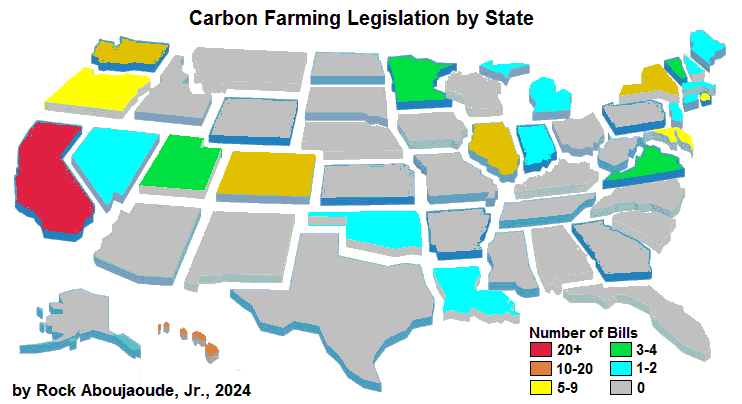By Rock Aboujaoude Jr., Campus Climate Corps
As part of my master’s degree thesis, I did some in-depth research into the development of carbon farming across the USA. The results were astonishing: There are 26 states developing serious programs, of which seven states are leading the charge with full-fledged and deployed carbon farming projects.
Carbon farming is an approach to agriculture that builds organic matter (carbon) back in the soil, thereby improving fertility. Increasing the organic matter in our soils also helps reduce pollution runoff (nitrogen and phosphorus) into our waterways.
Farmers are seeing net increases in income in Hawaii, Colorado, Washington, Oregon, California and Minnesota, while the soils are also proven to be healthier, yielding more and showing massive reductions in their overall greenhouse gas emissions.

The funny thing is, Florida, with its over 2.5 million jobs in agriculture, hasn’t moved an inch in this direction.
In 2020, then-state Sen. José Javier Rodríguez introduced a bill on carbon farming which would have begun a similar transformation in the Florida agricultural sector. The bill died in the Florida Senate Agriculture Committee. In the four years since then, Florida has lost significant ground in the race to carbon neutrality, and millions of dollars in benefits to her farmers.
Florida’s agriculture is a cornerstone of our economy. Yet, it is also responsible for over 10 million metric tons of CO2 equivalent emissions annually (according to the U.S. Environmental Protection Agency’s Inventory of U.S. Greenhouse Gas Emissions and Sinks). This figure was calculated in 2020, and has no doubt increased since then.
In the meantime, states like California and Hawaii have turned carbon farming into economic boons. Our farmers are being left behind in the race to carbon neutrality, leaving behind millions of untapped incomes, at a time when our farmers need income the most to avoid the lure of selling out to residential development.
In California, the state’s Healthy Soils Program has led to significant emission reductions, with a net decrease of 0.5 to 1.5 metric tons of CO2 annually since 2000. Meanwhile, farmers are benefiting financially. In 2021 alone, California paid out $40 million to farmers who demonstrated emission reductions through practices like cover cropping and compost application. Those same practices are proving to create far healthier soils, which are showing high yields as a result.
At the same time, Hawaii has embraced carbon farming practices such as cover cropping and reduced tillage. Similar to California, Hawaii’s net reduction in CO2 has proven both a benefit to the soil, but also a financial benefit to their farmers.

The loss for Florida isn’t just environmental, it’s economic. While Colorado, Washington and the rest are moving forward with this crucial technology, Florida is leaving millions on the table. Farmers elsewhere are benefiting from financial incentives and healthier soils, while our own struggle to make ends meet.
Had Florida passed carbon farming legislation in 2020, it’s likely our farmers would be seeing massive benefits from that legislation. But it’s not too late. January is just around the corner, and 2025 could be key for turning the next page in Florida’s environmental and economic future.
While it is almost impossible to calculate the missing revenue Florida could have had since 2020, we can accurately state that 2025 could be the year we provide carbon farming tools to our farmers, and seeing net benefits statewide. The time for action is now — before Florida misses out on even more opportunities.
Rock Aboujaoude Jr. is president of the Campus Climate Corps. He graduated from the University of Florida in August with a master’s degree in climate science and plans to begin his Ph.D. in January. Banner photo: Cover crops reduce soil erosion in an orchard. (Gary Kramer/USDA Natural Resources Conservation Service, via Wikimedia Commons).
If you are interested in submitting an opinion piece to The Invading Sea, email Editor Nathan Crabbe at nc*****@*au.edu. Sign up for The Invading Sea newsletter by visiting here.



